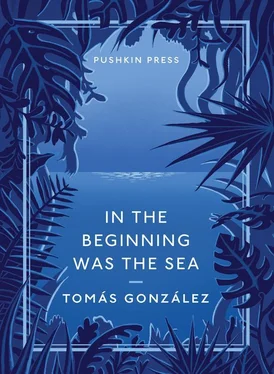The following morning, they set off back to the finca .
THE FIRST TIME J. complained to Octavio about his wife’s slipshod habits, the old man’s face clouded over, but he said nothing. He clearly did not discuss the matter with his wife since in the days that followed the house was as filthy and untidy as always. The first time J. said anything to the woman herself — politely asking her to stop the children from urinating and defecating everywhere — he realized that, aside from being slovenly, she was also insane.
“It’s not their fault, señor,” she said.
“I know it’s not their fault,” barked J. “Teach them to use the toilet!”
The woman burst into tears.
He had written a letter to Elena describing the steady deterioration of the meals and the housework. The quality of the food was much worse since Elena’s departure. J. would often push away his plate untouched, having spotted a cockroach or a dead moth in the frijoles , and had to open a tin of sardines if he was not to go to bed on an empty stomach. He had a nagging suspicion that all his meals might be contaminated by infant faecal matter. “It’s just a suspicion, hermana , only a laboratory would be able to say for sure. But whether or not it’s true, every time I sit down at the table, I can feel my stomach closing up like a poppy at night. Luckily the villagers still send food every now and then, and if I want something edible I just show up at Doña Rosa’s house and bluntly invite myself to lunch.”
Octavio and his wife had now been living on the finca for almost two months. Winter was finally over and the nights now were cloudless and strewn with stars. In the two months since their arrival, Octavio’s wife had not once washed the coffee pot. At night, J. sometimes heard the old man beating her, heard the woman crying or laughing hysterically. “I need to get rid of them as soon as possible,” thought J. “Either they leave, or I do.”
He began to consider the idea of hiring a competent estate manager and moving back to Medellín. Sometimes, he almost accepted that the finca was going nowhere; that without Elena it was hardly worthwhile; that he was sick and tired of the forest and the roar of the sea. But the prospect of moving back to Medellín, finding a job, having Ramiro or someone like him as a boss, brought him out in a cold sweat. He vaguely considered various business possibilities — a ceviche restaurant, a bar, a bookshop — but nothing seemed to fit. Besides, he was up to his neck in debt that he would have to pay off before he could even consider raising money for a new venture. Nor did he relish the thought of returning to the life he had lived before running away to the sea, the familiar routine of alcohol- and cocaine-fuelled sessions in dreary apartments and pounding rock music in nauseatingly “hip” nightclubs.
Sometimes, when he had a particularly brutal hangover, or during long afternoons spent drinking on the veranda alone — he felt uncomfortable drinking with Octavio — J. saw everything with such crystal clarity that he felt as though the land had trapped him here for all time. He wrote to a woman who had been his lover years earlier, telling her he felt so alone it sometimes seemed as though his life were drawing to a close. “But I plan to go on living,” he wrote. “After all, the sea is not so bad and even the palm trees are beautiful in a way.”
He had word from Elena that she was thinking of going to stay with one of her brothers in Venezuela. The job prospects there were good, apparently, and the pay for people with no qualifications was better than in Colombia. It was not a letter, but simply a scribbled note — Elena was busy preparing for her trip — that informed him that she was leaving. In it she gave him a forwarding address on the Isla Margarita and promised that as soon as she felt less stressed she would come back to him, to the finca . It ended with the words “I love you”.
For two months they exchanged increasingly infrequent letters, but still J. languished in this listless, indolent state, not knowing whether he could leave, where he could go, or why he might stay. He had lost any sense that his actions served a purpose. He tried to justify his life through the sensual pleasures offered by what passed before his eyes: the seagulls, the flaring sunsets, the sail of a fishing boat far out on the open sea. He drank in order to escape the endless turmoil of the house. He had still not found anyone to replace Octavio; people seemed to fear him and no one dared take his place. He began to hear rumours about the man, none of them good; people said he had murdered a neighbour on his finca in Balboa; they said the old man had spent time in Quibdó gaol where he had stabbed and been stabbed many times. People said all these things, as usual, only after it was too late. Other than Elena, the only person to actually warn J. was Doña Rosa. She told him to be wary of Octavio, that there was evil in his eyes.
J. wrote to one of his brothers-in-law who owned a sugar cane plantation in the Valle del Cauca asking whether there might be work for him there, perhaps as an overseer.
If there came an answer, he never received it.
ONE MORNING, J. got up early despite drinking all night. The moment he opened his eyes he was wide awake and convinced that the time had come to dismiss the lumbermen, to dismiss Octavio, to find someone to manage the finca and to leave this place forever. Stepping out onto the veranda, he saw an emerald-green iguana basking on top of one of the fence posts. “I’ve never seen a stamp with an iguana on it,” he thought. He considered this notion and realized he was happy. The sea was glassy as a mirror and the sound of the waves breaking was fitful as the breathing of a sleeping animal. “A huge, slumbering beast,” he thought. “A pathetic literary cliché—you’re not exactly inspired this morning, little man. But there’s a grain of truth in it.”
He was happy.
He decided not to have breakfast at the house and walked to the village where they fed him eggs and fried plantains. He had already begun to see things through the eyes of someone about to leave. He felt a pang of nostalgia. He loved the village, the orange grove, loved Doña Rosita and the locals, loved the smell of smoke wafting from the houses and the scent of soap that drifted from the villagers. He took a short walk through the forest, trying to avoid the workmen and, at noon, as he passed back through the village, he bumped into the wife of Miguelito, one of Doña Rosa’s sons, who offered him lunch. They ate together and then he and Miguelito — who was sweet and terribly shy — walked back to the house. As they arrived, he saw that the iguana had not moved, something he found strange. It seemed stranger still that the animal did not scuttle away when he approached. It was warm from lying in the sun all day but had probably been dead when he first saw it that morning.
At five o’clock he went out to the mango tree and picked a few green fruits. He sat on the veranda to drink one last bottle while he stared out at the sea. “A week from now, I’ll be in Medellín,” he thought. “Or maybe I should head straight to the Valle del Cauca, see if they’ve got any work for me.” He drank slowly, careful to pace himself so that he did not miss the sunset. Then the vast night drew in and a bright crescent moon blazed on the horizon. And with the night came Octavio, who greeted him and went into the kitchen where his wife could serve him dinner. Gilberto passed in front of the house on his way back from town and J. invited him to come up and have a couple of drinks.
J. informed him that he was leaving and that Octavio and the lumbermen would be leaving too. He would need someone to check on the finca now and then; he also wanted to give the horses to someone who could look after them and find a use for them. “I’ll have to come back from time to time, Gilberto,” he said. “For the moment, if I can make a little money, I’ll invest it in having the house done up so it can be rented out to tourists. One way or another, Octavio will be leaving so if you know anyone who would be prepared to live here and keep an eye on things, please, let me know.” Their elbows on their knees, the two men talked in whispers so the old man would not overhear.
Читать дальше










